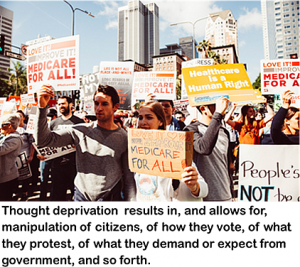The Push for Medicare-for-All is Thought Deprivation in Full View
5 April 2019
Over a (just concluded) series of three columns, I contended that thought deprivation has taken a foothold in America. The series examined seven steps employed by power-seeking politicians, and others driven by the same aim, to develop and sustain thought deprivation among people living in America. “Living in America” is used here instead of “American citizens” because the effort even reaches out to non-citizens and illegal migrants. Each column opened with the following statement:
There is a dangerous, but tremendously effective, political approach being employed in America. It could be called “Thought Deprivation”. That is, conditioning people so that they do not think with depth regarding the issues that face us as a nation. Sadly, allowing this “Thought Deprivation” approach to become routine and embedded in the political process has brought us to a point of real danger in the governing, and very survival, of this nation. Many actions that should reasonably be taken are not taken. Other actions are taken that adversely impact the well-being of Americans. Finally, gridlock is a frequent consequence of this political approach; nothing is done regarding important matters affecting the people of our country.
 Examples abound that show how thought deprivation plays out, and so negatively, in the American political process. Among the many examples is what is happening as Medicare-for-all is being discussed and considered in our country. What is presented here is not an argument for, or against, such a program; it is, instead, a limited examination of how little depth of thought is being given to this proposal that could dramatically effect American residents for years to come.
Examples abound that show how thought deprivation plays out, and so negatively, in the American political process. Among the many examples is what is happening as Medicare-for-all is being discussed and considered in our country. What is presented here is not an argument for, or against, such a program; it is, instead, a limited examination of how little depth of thought is being given to this proposal that could dramatically effect American residents for years to come.
Start the examination with how little residents know about Medicare-for-all. This from an article by Katie Mahoney titled, “‘Medicare for All’ isn’t the Health Care Reform Americans Want, Poll Finds”:
Many Americans don’t understand what Medicare for All is, and when they do, they don’t like it, a Morning Consult poll commissioned by the U.S. Chamber found.
The poll found only four-in-ten (41%) knew much about Medicare for All. When asked, most voters believes it is “a system that ensures that all Americans have access to health care services and insurance through a mix of private health care and government programs such as Medicare and Medicaid.”
Fewer than one-in-five voters polled could identify it as “a government-run health care system, financed by taxpayers that provides essential health care to all Americans and eliminates private health insurance plans, including those provided by employers.”
When asked if they support just such a program, only 44% supported the idea.
A reasonable question is how can it be that people know very little about Medicare-for-all? One reason is that most media has joined forces with the effort to develop and sustain thought deprivation. They simply do not aim to explain issues in detail and coverage is, most often, slanted to support a particular position regarding an issue. I watch a lot of news and commentary. It disgusts me that most offerings are very short, timewise, on a topic and almost totally devoid of serious, of honest, analysis of facts.
Possibly more disturbing is that politicians, and others, involved in seeking to gain and hold power are even guiltier of the failing ascribed to media in the preceding paragraph. Anytime I hear a member of this group give a straight answer to a question that calls for actually informing the electorate, I am surprised beyond description. A case-in-point came when the following happened, during an interview of Senator Kamala Harris (Dem-CA, presidential candidate), as reported in an article by Grace Sparks titled, “Majority favor ‘Medicare-for-all,’ but with a catch”:
Harris spoke in Iowa on Monday about embracing Medicare-for-all, even though in most instances it means eliminating private insurance. When pressed by CNN’s Jake Tapper on whether that means eliminating private insurance, the senator from California answered affirmatively, saying she would be OK with cutting insurers out of the mix.
Note that Senator Harris had to be pressed for an answer, but did, in fact, answer. This kind of avoidance, by power-seekers, results in the public allowing governmental actions that do not serve the best interest of, or show fairness toward, all Americans. However, the approach survives and is far too successful because there is deprivation of thought.
One would also think that cost should be a pressing question from the public in reference to Medicare-for-all. In that regard, the following from an article by Jennifer Earl titled, “How much would ‘Medicare for All’ cost? Democrats’ health care plan explained”, provides some insight:
Several independent studies have estimated that government spending on health care would increase dramatically, in the range of about $25 trillion to $35 trillion or more over a 10-year period. Specifically, a study released over the summer by the Mercatus Center at George Mason University estimated it would cost $32.6 trillion — $3.26 trillion per year — over 10 years. For comparison, the federal budget proposal for the fiscal year 2019 was $4.4 trillion, the Congressional Budget Office states.
Sanders blasted the Mercatus Center’s analysis as “grossly misleading and biased.”
“If every major country on earth can guarantee health care to all, and achieve better health outcomes while spending substantially less per capita than we do, it is absurd for anyone to suggest that the United States cannot do the same,” Sanders replied, arguing on his website that his plan would cost about $1.38 trillion per year. “This grossly misleading and biased report is the Koch brothers’ response to the growing support in our country for a ‘Medicare for all’ program.”
Senator Sanders’ response assumes that America would do a program similar to the other countries, to which he makes a general reference. My research indicates what he and others seem to be proposing is not done by any of the countries viewed as somewhat successful in assuring health care for all citizens.
I hold it is very safe to say that nobody has a good idea as to what Medicare-for-all would cost. It even appears that there is not consensus on what the program would offer or how it would work. However, it is a fact that taxes would increase for some American citizens.
Interestingly, support for the concept is strong. That is, until people get informed. The following information, from Kaiser Family Foundation (KFF) Tracking Poll (Conducted January 9-14, 2019) appears in an article by Jane Sarasohn-Kahn titled, “Americans Are Warming to Universal Health Care, Kaiser Poll Finds”:
Would you favor or oppose a national Medicare-for-all plan if you heard that it would do the following?
Guarantee health insurance as a right for all Americans
71% favor/27% oppose
Eliminate all health insurance premiums and reduce out-of-pocket health Care costs for most Americans
67% favor/30% oppose
Eliminate private health insurance companies
37% favor/58% oppose
Require most Americans to pay more in taxes
37% favor/60% oppose
Threaten the current Medicare program
32% Favor/60% oppose
Lead to delays in people getting some medical tests and treatments
26% favor/70% oppose
As people get more informed regarding Medicare-for-all, or any issue of importance, interest elevates and critical thinking happens. This is not an outcome that serves the aims of power-seekers well. Thought deprivation is, therefore, a primary strategy. In general, we permit the deprivation to work. It results in, and allows for, manipulation of citizens, of how they vote, of
what they protest, of what they demand or expect from government, and so forth. If we, in America, do not immediately break free of imposed thought deprivation, not only will current generations suffer harsh consequences; we will impose insurmountable challenges on generations yet unborn.




